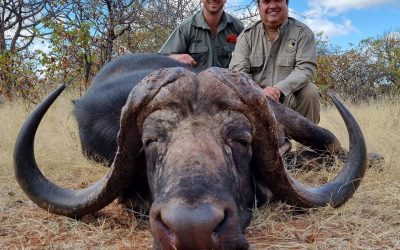So you’ve always dreamed of going on a hunting expedition in the wilds of Africa, but you’re not quite sure about the costs involved. Well, look no further, because in this article, we’ll be shedding light on the intriguing question of trophy fees for hunting in Africa. Whether you’re a seasoned hunter or just a curious adventurer, understanding these fees is crucial for planning your expedition and making sure it aligns with your budget. So, let’s dive in and explore the fascinating world of trophy fees in Africa!
Trophy Fees Overview
What are trophy fees?
Trophy fees are charges that hunters must pay for harvesting specific animals during hunting expeditions in Africa. These fees are separate from daily rates and cover the cost of each trophy animal taken during the hunt. Trophy fees vary depending on the animal species, size, and rarity.
Why are trophy fees charged?
Trophy fees serve several purposes. Firstly, they act as a conservation tool by providing financial incentives for landowners and local communities to protect wildlife habitats through sustainable hunting practices. Secondly, trophy fees contribute to wildlife management programs, anti-poaching efforts, and conservation initiatives aimed at preserving Africa’s rich biodiversity. Additionally, trophy fees help ensure responsible hunting practices by discouraging indiscriminate hunting for the sake of sport.
Are trophy fees standardized in Africa?
Trophy fees are not standardized across Africa. They vary from country to country, and even within different regions of a country. Each country and hunting outfitter sets their own fee structure based on factors such as local wildlife populations, hunting areas, conservation efforts, and market demand for specific animals. It is essential for hunters to research and understand the trophy fee structure of their chosen hunting destination.
Factors that influence trophy fees
Several factors influence trophy fees for hunting in Africa. These include the scarcity or abundance of a particular species, the difficulty of hunting the animal, the desired size or trophy quality, and the market demand for that species. Factors such as the cost of licensing, permits, and transportation logistics also contribute to the overall trophy fee. Additionally, certain seasons or peak times for hunting specific animals may impact the fees charged.
Big Game Trophy Fees
Lion
Lion trophy fees are among the highest in Africa due to the significance and popularity of lion hunting. These fees can range from several thousand to tens of thousands of dollars, depending on the country and size of the lion. It is important to note that lion hunting is subject to strict regulations and quotas to ensure sustainability and conservation.
Leopard
Leopard trophy fees also tend to be high, as these elusive creatures are challenging to hunt and are highly sought after by trophy hunters. Fees for harvesting a leopard range from a few thousand to tens of thousands of dollars. Similar to lion hunting, leopard hunting is regulated to protect the species and maintain a balance in the ecosystem.
Elephant
Elephant trophy fees are typically the highest among big game species. Due to stringent conservation efforts and the decreasing population of elephants in many parts of Africa, hunting an elephant requires a significant financial investment. Elephant trophy fees can reach six figures, with certain countries imposing additional costs for elephant hunting permits and anti-poaching measures.
Rhinoceros
Rhinoceros trophy fees are exceptionally high, reflecting the critically endangered status of these magnificent animals. Governments set strict quotas and regulations for rhino hunting, and the proceeds from trophy fees contribute to conservation efforts focused on protecting these vulnerable species. Rhino trophy fees can range from tens of thousands to well over six figures.
Cape Buffalo
Cape buffalo, also known as African buffalo, are a sought-after trophy species due to their size and formidable nature. Trophy fees for hunting Cape buffalo can vary depending on factors such as horn size and trophy quality. Fees generally range from several thousand to tens of thousands of dollars, depending on the country and specific hunting area.
Other hunting opportunities
In addition to the aforementioned big game species, there are numerous other hunting opportunities in Africa. These may include animals such as crocodiles, hippopotamuses, hyenas, and various antelope species. Each animal carries its own trophy fee, with prices varying depending on scarcity, hunting difficulty, and market demand.
Plains Game Trophy Fees
Antelope species
Plains game species such as impalas, kudus, elands, and gazelles are popular hunting targets in Africa. Trophy fees for these antelope species typically range from a few hundred to a few thousand dollars, depending on the species and size of the trophy desired. Multiple animals can be hunted during a safari, allowing hunters to pursue a diverse range of antelope species.
Zebra
Zebra trophy fees can vary based on the specific zebra species targeted and the country in which the hunt takes place. Trophy fees for common plains zebra typically range from a few thousand to several thousand dollars. However, rare species such as the Cape Mountain zebra may command higher trophy fees due to their limited population and hunting restrictions.
Giraffe
Giraffe hunting is becoming more regulated due to conservation concerns, with some countries imposing hunting moratoriums on these iconic animals. Trophy fees for hunting giraffes vary based on the country and specific circumstances, with fees ranging from several thousand to tens of thousands of dollars.
Warthog
Warthogs are a popular target for hunters seeking plains game. Trophy fees for warthogs are relatively affordable, typically ranging from a few hundred to a few thousand dollars. Hunting warthogs can offer an exciting and accessible hunting experience for both new and experienced hunters.
Other plains game species
Africa offers a vast array of other plains game species available for hunting, including wildebeest, hartebeest, oryx, and bushbuck. Trophy fees for these species vary depending on the specific animal, the size of the trophy desired, and the hunting destination. Costs can range from a few hundred to several thousand dollars.
Additional Fees and Considerations
Daily rates
In addition to trophy fees, hunters must consider daily rates charged by hunting outfitters. These rates usually cover accommodation, meals, professional guides, and other amenities during the hunt. Daily rates can vary depending on the location, quality of accommodation, and services provided. It is essential to factor in these costs when budgeting for a hunting safari.
Government taxes and permits
Government taxes and permits are an integral part of hunting in Africa. Each country has its own set of regulations and fees governing trophy hunting. These costs can include hunting licenses, permits for specific animals, and taxes levied on hunting activities. It is crucial to familiarize yourself with the legal requirements and associated expenses of the chosen hunting destination.
Trophy export/import fees
Export and import fees are essential considerations when planning a trophy hunt in Africa. Once a trophy animal has been harvested, the process of exporting it to the hunter’s home country may involve bureaucratic procedures and associated costs. Import fees may also apply upon the hunter’s return home. These fees can vary depending on the country of export/import and the specific requirements and regulations in place.
Accommodation and travel expenses
When booking a hunting safari, it is important to account for accommodation and travel expenses. Accommodation options can range from basic tented camps to luxurious lodges, each with varying costs. Travel expenses include airfare, ground transportation, and possibly additional excursions or sightseeing activities before or after the hunt. It is advisable to consider these costs when planning your hunting adventure.
Tips and gratuity
Tipping guides, trackers, and other staff is an expected practice in the hunting industry. While tipping is at the hunter’s discretion, it is customary to show appreciation for the services provided. Hunters should budget for gratuities based on their overall experience and satisfaction with the staff’s professionalism and assistance.
Hunting Packages and Price Ranges
Different safari packages available
Hunting outfitters offer a range of safari packages tailored to suit various preferences and budgets. These packages can include different combinations of hunting opportunities, accommodation options, and additional activities. Safaris may be categorized based on the duration of the hunt or the specific animals targeted. It is essential to assess different package options and choose the one that aligns with your hunting goals and financial means.
Value packages vs. premium packages
Hunting packages can be divided into value packages and premium packages. Value packages are designed to offer an affordable hunting experience without compromising the quality of the hunt. They often include hunting for plains game species and may have more modest accommodation options. Premium packages, on the other hand, cater to those seeking exclusive hunting opportunities, luxury accommodations, and access to more sought-after and expensive trophy species.
Price ranges for various hunting experiences
Hunting experiences in Africa can range widely in price depending on factors such as the species targeted, the duration of the hunt, and the level of luxury desired. Entry-level hunts for plains game species may start around $2,000 to $5,000, excluding trophy fees. Mid-range hunts for bigger game species such as lion or buffalo can range from $10,000 to $30,000, excluding trophy fees. High-end trophy hunts for rarer or more prestigious species can exceed $100,000, including trophy fees and additional costs.
Hunters’ Responsibilities and Ethics
Importance of responsible hunting practices
As a hunter, it is essential to understand and practice responsible hunting ethics. This includes adhering to local hunting regulations, following sustainable hunting practices, and targeting mature animals rather than indiscriminately shooting trophy specimens. Responsible hunting ensures the long-term viability of wildlife populations and contributes to conservation efforts in Africa.
Respecting local customs and regulations
Hunters must respect and abide by the customs, traditions, and regulations of the local communities and countries where they are hunting. This includes respecting the cultural significance of certain animals, adhering to local hunting seasons and quotas, and recognizing the authority of local guides and authorities. Respecting these customs fosters positive relationships with local communities and helps support their conservation efforts.
Sustainable hunting and conservation efforts
Trophy hunting can contribute to sustainable conservation efforts when done responsibly. By providing financial incentives for landowners and communities to conserve wildlife and their habitats, trophy hunting can play a role in preserving biodiversity and supporting anti-poaching initiatives. It is crucial for hunters to choose reputable outfitters with a commitment to sustainable hunting practices and supporting local conservation efforts.
Understanding the ethical aspects of trophy hunting
Trophy hunting is a topic of ethical debate. Hunters must educate themselves on the different arguments surrounding trophy hunting, including discussions on ethics and animal welfare. Understanding opposing viewpoints and engaging in respectful dialogue can contribute to a more informed perspective on the complexities surrounding trophy hunting in Africa.
Booking and Planning
Researching reputable outfitters
When booking a hunting safari, it is important to research and select reputable outfitters. Read reviews, seek personal recommendations, and evaluate outfitters’ track records and commitment to responsible hunting practices. Reputable outfitters will prioritize conservation, uphold ethical hunting standards, and provide a safe, professional, and enjoyable hunting experience.
Understanding contractual terms and conditions
Before finalizing a hunting safari, thoroughly review the contractual terms and conditions. Pay attention to details such as deposit requirements, cancellation policies, liability waivers, and any additional fees or charges. Understanding these terms and conditions ensures a transparent and mutually beneficial agreement between the hunter and the outfitter.
Securing necessary permits and licenses
Securing the necessary permits and licenses for hunting in Africa is crucial. Research the specific requirements of the chosen hunting destination and work with the outfitter to obtain the appropriate documentation. This includes obtaining hunting licenses, firearm permits, and any other permits or visas required by the host country.
Making travel arrangements
Once the hunting safari is booked, make necessary travel arrangements. This includes booking flights, arranging travel insurance, and ensuring compliance with airline regulations regarding firearms and trophy transportation. It is recommended to consult with a travel agent experienced in African hunting travel to navigate these logistical considerations successfully.
Booking accommodations and safari logistics
Coordinate with the outfitter to book suitable accommodations and finalize safari logistics. Discuss accommodation preferences, such as tented camps, lodges, or luxury resorts, and consider factors such as proximity to hunting areas and desired comfort levels. Clear communication and planning will help ensure a seamless and enjoyable hunting experience.
Alternatives to Trophy Hunting
Photographic safaris
For those who wish to experience Africa’s wildlife without hunting, photographic safaris provide an alternative. These safaris focus on capturing stunning images of wildlife in their natural habitats, offering opportunities for up-close encounters and memorable experiences without the need to hunt or harvest animals. Photographic safaris contribute to local economies and wildlife conservation by promoting the value of living animals.
Ecotourism opportunities
Ecotourism is another sustainable alternative to trophy hunting. Visitors can participate in activities such as bird watching, guided nature walks, conservation lectures, and cultural experiences that support local communities and conserve natural habitats. Ecotourism promotes the economic value of wildlife and encourages the preservation of Africa’s incredible biodiversity.
Volunteering in conservation projects
For those passionate about wildlife conservation, volunteering opportunities exist in various African countries. Joining conservation projects allows individuals to actively contribute to protecting endangered species, supporting anti-poaching efforts, and promoting sustainable conservation practices. Volunteers can engage in field research, habitat restoration, community education, and other initiatives that make a tangible difference in Africa’s conservation efforts.
Controversies and Criticisms
Ethical concerns and animal welfare
Trophy hunting in Africa has faced significant ethical scrutiny and criticism. Concerns over the welfare of hunted animals, hunting methods, and the motivations of trophy hunters have sparked heated debates. Animal rights activists argue that hunting for sport is inherently cruel and unnecessary, while proponents of regulated trophy hunting argue that it can contribute to conservation efforts. Understanding the various perspectives is crucial to engaging in informed discussions on these ethical concerns.
Legal challenges and restrictions
Trophy hunting in Africa has faced legal challenges and restrictions over the years. Some countries have implemented moratoriums on specific species, while others have banned trophy hunting altogether. Legal frameworks surrounding hunting are dynamic and subject to change. Hunters must stay informed about any legal developments and ensure compliance with local regulations to avoid legal complications.
Effects on local communities
Trophy hunting can have both positive and negative effects on local communities. On one hand, hunting generates revenue that supports local economies, provides employment opportunities, and contributes to community development projects. On the other hand, concerns exist regarding the equitable distribution of economic benefits and the potential displacement of local communities from their traditional lands. It is crucial for hunting outfitters and hunters to prioritize sustainable community engagement and ensure their activities genuinely benefit local stakeholders.
Debates surrounding the conservation benefits
The conservation benefits of trophy hunting remain a topic of debate. Proponents argue that trophy hunting revenue can financially support conservation efforts, fund anti-poaching initiatives, and protect wildlife habitats. Critics, however, question the effectiveness of this model, emphasizing the importance of alternative conservation methods such as ecotourism and non-consumptive wildlife-based industries. Understanding these debates and seeking well-rounded perspectives is vital when evaluating the broader conservation implications of trophy hunting.
Conclusion
In conclusion, trophy fees for hunting in Africa play a significant role in supporting wildlife conservation efforts, incentivizing sustainable hunting practices, and contributing to local economies. Trophy fees can vary widely depending on the species, size, and scarcity of the animals targeted. Hunters must consider various factors, including daily rates, government fees, trophy transportation costs, and accommodations when budgeting for a hunting safari. Responsible hunting practices, respect for local customs, and engaging in informed discussions on ethical considerations are essential for prospective hunters. It is also crucial to explore alternatives such as photographic safaris, ecotourism, and volunteering opportunities for those who wish to experience Africa’s wildlife without engaging in trophy hunting. By understanding the complexities, controversies, and ongoing debates surrounding trophy hunting, hunters can make informed decisions and contribute positively to African conservation efforts.











